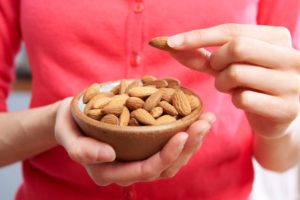
Did you know that what you eat can have a big impact on the quality of your sleep? Whether you struggle with sleep apnea in Fort Worth, or you are just looking to improve your nightly rest, making some minor adjustments to your diet may help you get the rejuvenating shuteye that your body needs and deserves. Read on below to learn about some specific nutrients and foods that promote high-quality sleep.
Tryptophan
If you celebrate Thanksgiving, you probably enjoyed a delicious turkey dinner last month. Did you notice that you felt sleepy afterward? That was likely due to turkey’s high tryptophan content. Tryptophan is an amino acid that plays a role in the human body’s production of serotonin and melatonin, chemicals that are important in the sleep-wake cycle.
Of course, turkey is not the only food that contains tryptophan. It is found in many animal products, including dairy, fish, eggs, and many types of meat. If you are vegan or vegetarian, you can turn to oats, nuts, and seeds to bolster your tryptophan intake.
Calcium
Among its many other benefits, calcium helps your body to use tryptophan efficiently. Inadequate calcium levels are linked with sleep disturbances and insufficient REM sleep. (REM sleep is the part of your sleep cycle when most dreams occur.)
Dairy products are an excellent way to get more calcium into your diet. If you are sensitive to lactose, you can increase your calcium intake by consuming these foods:
- Almonds
- Chia seeds
- Broccoli
- Sweet potatoes
- Butternut squash
- Kale
Magnesium
According to one estimate, the standard diet in the U.S. contains only about 50% of the recommended daily intake of magnesium. That is a reason for concern because magnesium plays an essential role in numerous bodily functions. It is even commonly associated with insomnia and frequent nighttime awakenings.
Here are some foods that contain this important micronutrient:
- Nuts and seeds (cashews and almonds are particularly valuable sources of magnesium)
- Legumes
- Whole grains
- Dairy products
- Dark chocolate (aim for at least 70% cocoa)
Additional Tips for a Sleep-Friendly Diet
Here are a few additional eating and drinking tips that can promote high-quality sleep:
- Many people have found that a cup of chamomile tea before bed helps them relax and improves the quality of their sleep. Other types of tea, particularly those marketed as “bedtime” teas, have mixtures of ingredients that promote relaxation.
- It is best to avoid alcohol and caffeine within the last few hours before bedtime. If you are sensitive to caffeine, it could be beneficial to stop consuming it before noon.
- You should not eat a large meal right before bed. A light snack can stave off hunger without making you overly full.
What you eat can have a big impact on the quality of your sleep! Use the tips in this article to adjust your diet and improve your nightly rest.
Meet the Practice
Under the leadership of Dr. Mitch Conditt, Fort Worth Snoring and Sleep Center focuses on helping patients conquer sleep apnea via oral appliance therapy. If you suspect that you have a sleep disorder, we can guide you on your next steps. Contact us at 817-527-8500.
